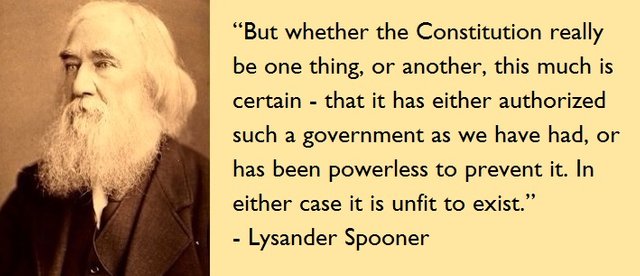A question for the constitutional scholars
If I had to pick a favorite, my favorite amendment to the US Constitution would be the ninth. If you know me, you see how easy that is to call.
The enumeration in the Constitution, of certain rights, shall not be construed to deny or disparage others retained by the people.
It basically says "hey, we may have left something out, so this list isn't exhaustive." It also leaves many questions to be asked.
My favorite point to make is that no such clause exists in the context of government. It doesn't say "The enumeration in the Constitution, of certain powers, shall not be construed to deny or disparage others retained by the state.

So the founders in their wisdom saw fit to include a clause for the expansion of the rights of the people, but not for the expansion of the powers of the state. I'd like to ask where the power of delegation of powers is located. What's the bit that allows the legislature to delegate the powers of taxation and coining of money? Where does it say that there can be so many hundreds of federal police agencies? Where does it say people can't decide what to put in their body or that they don't own themselves? Cause I can show you where it says they can and do. Where does it say that the government may spy on everyone always? Cause I can show you where it says they can't.
I would even go so far as to state that the ninth is the only amendment that matters in the least bit.
Which begs Lysander Spooner's question:
Does the US Constitution allow the creation of a police state, or has it been powerless to stop it?
I think @burntoblog and I have had this discussion before. I would like more clarification from anyone that cares to explain.
Stay relevant
Nate
"A Republic ma'am, if you can keep it.."
So the people have allowed it, or have been powerless to stop it.
P.s. wow that was fast!
https://play.google.com/music/m/D3mapn7tjsom6lmjxatdy4hviwq?t=Trey_Goff_A_Constitution_for_a_Free_Society_-_Mises_Weekends
And
https://play.google.com/music/m/Dxejns4zhtf7oekaix7xdxj24tq?t=Claudio_Grass_on_Whether_Switzerland_can_Save_the_World_-_Mises_Weekends
You'd appreciate them both. I'm not done with the constitution one yet. Did you get a chance to read the EOS constitution yet?
The collective of individuals have allowed it. Over the fateful cliché, "It's just ______". Just a little liberty here for a little social security here. . .
At which point did the people forsake the equity of arms and means, as the state that was inso supported? Why has the government any more power than that of the people that make it up? The effects of the state should be equal inasmuch as the people should naturally, in line with objective Justice and Law, be able to commit in defense of Property and Personnel?
Powerless to stop it. There are numerous things, some you mentioned, that the government shouldn't be able to do. But they do it anyway. The people are complicit in its size and scope. But even worse, they still believe that the myth is actually real.
I wonder. The US Constitution is written very similar to the Swiss constitution. They have turned out much better than us under similar conditions with only a few glaring differences.
The major difference is that the US is a superpower. There is no other like it. Your 3 reasons why all boil down to the US having a monopoly on the reserve currency. A country (like the US) must have interventionist wars, must be very centralized, and most taxes must go to fund war and debt, if they want to continue to be the superpower. If the Swiss Franc (?) was the reserve currency, or any other country had it, it would be the same outcome for them (at some point in time). Political power (any, even a constitution)) is the ring, no one can handle it without succumbing to the darkness.